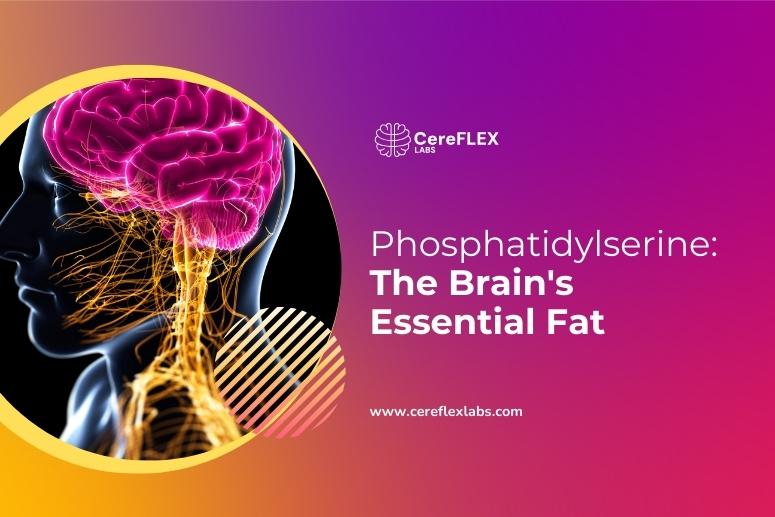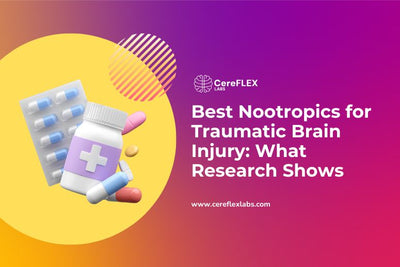Mental clarity is becoming more important than ever. Whether you’re an athlete striving for sharper focus, a senior aiming to preserve memory, or someone dedicated to cognitive wellness, phosphatidylserine (PS) is a powerful nutrient worth exploring.
As a key component of brain cell membranes, phosphatidylserine plays a vital role in memory retention, focus, and learning ability. But how exactly does it support cognitive health, and why has it become a go-to supplement for mental performance?
In this guide, we’ll dive into the science behind phosphatidylserine, its role in brain function, and why it’s gaining popularity as a natural cognitive enhancer. Whether you're considering adding it to your routine or simply curious about its effects, we’ve got the insights you need to make an informed decision.

What is phosphatidylserine?
Phosphatidylserine (PS) is a naturally occurring phospholipid and a crucial component of brain cell membranes. It plays an essential role in maintaining cell structure, communication, and overall brain function.
As a key building block of neural membranes, PS supports:
-
Neurotransmitter release, ensuring efficient signal transmission between brain cells.
-
Synaptic activity, which enhances learning, memory, and cognitive processing.
-
Receptor function, allowing brain cells to respond effectively to chemical signals.
-
Inflammation regulation, helping to reduce neuroinflammation that can contribute to cognitive decline and neurological disorders.
While the body naturally produces phosphatidylserine, levels tend to decline with age, potentially contributing to age-related cognitive decline. Research suggests that low PS levels may be linked to neurodevelopmental disorders such as ADHD and autism, as well as neurodegenerative diseases like Alzheimer’s and Parkinson’s.
By maintaining optimal phosphatidylserine levels, individuals can support brain health, cognitive performance, and long-term mental clarity.
Chemical Structure and Natural Occurrence
Phosphatidylserine (PS) is a type of phospholipid, a class of fats that are essential for cell membrane integrity and function. Structurally, it consists of:
- A glycerol backbone, forming the molecular framework.
- Two fatty acid chains, which contribute to membrane flexibility.
- A phosphate group attached to serine, an amino acid that enhances cell signaling and brain function.
This unique structure allows phosphatidylserine to be amphipathic, meaning it attracts water on one side and repels it on the other. This property helps maintain the fluidity and stability of cell membranes, which is essential for optimal brain function and neurotransmission.
Where is phosphatidylserine found?
Although phosphatidylserine is naturally produced in the body, its highest concentration is found in the brain, where it plays a vital role in neuron health and communication. However, PS levels decline with age, making dietary intake or supplementation beneficial for cognitive support.
Natural Sources of Phosphatidylserine
You can obtain phosphatidylserine from various food sources, including:
- Soybeans
- Organ meats (e.g., liver, kidney)
- Egg yolks
- Fatty fish (e.g., mackerel, herring, salmon)
- White beans and cabbage (in smaller amounts)
Incorporating these foods into your diet can help support brain function and overall cognitive health. However, due to dietary restrictions or aging-related decline, many individuals turn to phosphatidylserine supplements for an additional cognitive boost.
What are the benefits of phosphatidylserine for brain health?
Phosphatidylserine (PS) is a well-researched nootropic known for its ability to enhance cognitive function and support brain health. As a key ingredient in many memory enhancing supplements, it plays a crucial role in improving:
-
Memory – Helps retain and recall information more effectively.
-
Thinking Skills – Supports problem-solving, reasoning, and decision-making.
-
Focus and Attention – Enhances concentration and mental clarity.
-
Stress Reduction – Lowers cortisol levels, promoting relaxation and emotional balance.
-
Sleep Quality – Supports better sleep patterns by regulating stress hormones.
Phosphatidylserine and Neurological Conditions
Beyond general cognitive enhancement, phosphatidylserine may help manage symptoms of:
-
Lipid Imbalances in ADHD – Supports neurotransmitter function, potentially improving focus and hyperactivity.
-
Depression and Anxiety – Modulates mood-related neurotransmitters like serotonin and dopamine.
-
Alzheimer’s Disease – May slow cognitive decline and improve memory in early-stage cases.
Due to these wide-ranging benefits, phosphatidylserine is gaining popularity as a natural cognitive booster for individuals of all ages.
Research on How Phosphatidylserine Supports Brain Health
Phosphatidylserine (PS) is essential for optimal brain function, serving as a structural component of neuronal membranes and playing a key role in neurotransmission, synaptic activity, and cognitive performance. As a critical phospholipid, PS supports memory, attention, learning, and overall brain health.
To understand the effects of phosphatidylserine for brain health, let’s explore key research findings on its role in mood regulation, cognitive function, stress management, and neuroprotection.

Phosphatidylserine and Mental Health: Combatting Depression
Depression is often associated with reduced blood flow in the brain and low phosphatidylserine levels, particularly in individuals with omega-3 deficiencies. Since PS influences mood-related neurotransmitters like dopamine and serotonin, increasing PS intake through food or supplements may help alleviate depression symptoms.
2015 Study on Elderly Patients with Depression
Researchers studied 18 elderly patients with major depression who had not improved after six months of antidepressant treatment. They took a supplement containing 100 mg of PS, 119 mg of DHA, and 70 mg of EPA three times daily. After 12 weeks, participants showed significant improvement on the Hamilton Depression Scale.1
➡ Key Takeaway: Phosphatidylserine may support mood stability and help individuals with treatment-resistant depression.
Additionally, some research indicates that PS can reduce anxiety and stress by modulating cortisol production.
Phosphatidylserine and Stress Reduction: Lowering Cortisol Levels
Cortisol, the body’s primary stress hormone, can negatively affect cognitive function when elevated for prolonged periods. Phosphatidylserine has been found to help regulate cortisol production, reducing both physical and emotional stress responses.
Study on Stress Hormone Regulation
Researchers tested soy lecithin-derived phosphatidylserine (PAS) in four groups taking 400 mg, 600 mg, 800 mg, or a placebo daily for three weeks. Before the Trier Social Stress Test (TSST), only the 400 mg PAS group experienced a significant drop in ACTH and cortisol levels. Participants in the 400 mg group also reported lower stress levels, while the placebo group felt more distressed.2
➡ Key Takeaway: 400 mg of phosphatidylserine may be the optimal dose for lowering both hormonal and emotional stress responses.
These findings highlight the potential of hormone regulation with phosphatidylserine in stress management.
Phosphatidylserine and ADHD: Supporting Symptom Management
Phosphatidylserine, often combined with omega-3 fatty acids, has been studied for its potential role in managing ADHD symptoms in children.
2012 Study in European Psychiatry
Two hundred children with ADHD were given either a placebo or a supplement containing phosphatidylserine and omega-3 fatty acids for 15 weeks. Those in the supplement group showed reduced hyperactivity and impulsivity in addition to improved mood and behavior.3
2014 Study on Phosphatidylserine for ADHD
A smaller study (36 children) compared PS supplementation vs. placebo over two months. The treatment group showed significant improvements in memory retention, attention span, and impulse control.4
➡ Key Takeaway: While promising, more research is needed to confirm the safety and long-term benefits of PS for ADHD management.
Phosphatidylserine and Memory Enhancement: Slowing Memory Loss & Alzheimer’s Disease
As phosphatidylserine levels decline with age, supplementation may help preserve cognitive function and reduce symptoms of neurodegenerative diseases like Alzheimer’s.
Study on Cognitive Impairment in Older Adults (Journal of Clinical Biochemistry and Nutrition)
Seventy eight older adults with mild cognitive impairment took PS or a placebo for six months. PS users showed significant improvements in memory compared to the placebo group.5
Study on Alzheimer’s Disease and Phosphatidylserine
Participants with early-stage Alzheimer’s took 300 mg of PS daily for eight weeks. Those in the PS group reported better overall well-being, though mental function tests showed no major differences from the placebo group.6
➡ Key Takeaway: Phosphatidylserine can enhance memory in aging adults, but more research is needed to determine its full effect on Alzheimer’s disease.
Phosphatidylserine and Athletic Performance: Boosting Physical and Mental Endurance
PS supplements may also benefit athletes by enhancing exercise capacity and reducing muscle soreness.
Research on Athletic Performance
Phosphatidylserine lowers cortisol levels, which helps combat overtraining fatigue. Some studies suggest it improves reaction time, endurance, and mental sharpness during intense exercise.
➡ Key Takeaway: Athletes may benefit from PS supplementation to enhance physical recovery and focus.
The research on phosphatidylserine underscores its broad benefits for brain health, including its role in:
✔ Improving memory and focus
✔ Reducing stress and anxiety
✔ Supporting ADHD management
✔ Enhancing athletic performance
As studies continue, phosphatidylserine remains a promising natural supplement for cognitive support across different age groups.
What foods are high in phosphatidylserine?
Phosphatidylserine (PS) is found naturally in certain foods, particularly those rich in healthy fats and proteins. While the body produces some PS, dietary sources can help maintain optimal levels, especially as natural production declines with age.
You can increase your phosphatidylserine intake by consuming:
-
Soybeans – One of the richest plant-based sources of PS.
-
Fatty Fish – Salmon, mackerel, and herring contain high amounts.
-
Egg Yolks – A natural source of brain-supporting phospholipids.
-
Organ Meats (e.g., chicken or beef liver, kidney) – Among the densest sources of PS.
-
White Beans and Cabbage – Contain smaller amounts but contribute to dietary intake.
Since dietary sources may not provide sufficient phosphatidylserine for cognitive health and brain function, supplements have become a popular alternative.
Phosphatidylserine supplements are typically derived from:
-
Soy – A widely used and safe plant-based source.
-
Fish – Naturally occurring in marine phospholipids.
-
Sunflowers – A newer, non-GMO, plant-based alternative.
-
Cabbage – Sometimes used in PS formulations.
Note: Earlier PS supplements were made from cow brains, but due to safety concerns regarding prion diseases, modern supplements now use plant-based or marine sources.

Phosphatidylserine Supplementation
For those seeking a convenient way to boost their brain health, various forms of phosphatidylserine are available as cognitive supplements:
-
Capsules/Tablets: The most common and convenient option.
-
Powder: The most common and convenient option.
- Softgels: Often combined with other brain-supporting nutrients like omega-3s.
Recommended Dosage:
The optimal dosage depends on individual needs and health goals, but general recommendations include 200–400 mg per day for 1–3 months for cognitive benefits – best taken with meals to enhance absorption. Consult a healthcare provider for personalized guidance, especially if taking medication.
Who Can Benefit?
-
Athletes: May help lower stress-related cortisol levels, improving recovery and endurance.
-
Seniors: Supports memory retention, thinking skills, and cognitive longevity.
- People Under Stress: Helps manage emotional and hormonal balance, particularly in high-pressure environments.
Whether through food or supplements, phosphatidylserine plays a crucial role in brain health, stress management, and cognitive support at every stage of life.
What are the risks of taking phosphatidylserine?
Phosphatidylserine (PS) is generally well-tolerated, especially when derived from soy or sunflower sources. However, higher doses (300 mg or more per day) may cause mild side effects in some individuals.
While rare, some users have reported:
-
Gas and bloating – Mild digestive discomfort.
-
Stomach upset – Especially when taken on an empty stomach.
-
Insomnia – Higher doses may interfere with sleep cycles in some people.
Medication Interactions
Phosphatidylserine can interact with certain medications, potentially altering their effects. If you are taking any of the following, consult your healthcare provider before supplementing with PS:
Blood Thinners & Clotting Medications
PS may have mild blood-thinning properties, which could increase the risk of bleeding when taken with anticoagulants like warfarin or aspirin.
Anti-Inflammatory Medications
NSAIDs (e.g., ibuprofen, naproxen) may interact with PS, potentially enhancing or reducing their effects.
Performance-Enhancing Drugs & Supplements
If you're taking pre-workout or endurance-enhancing supplements, PS may modulate stress hormone responses, which could alter performance outcomes.
Is phosphatidylserine safe for long-term use?
Current research suggests that short-term use (up to 3 months) is safe at doses between 200–400 mg daily. However, long-term effects are not yet fully understood, and higher doses may pose greater risks.
Recommendation: If you have existing health conditions, take prescription medications, or plan on long-term supplementation, consult a healthcare professional before adding phosphatidylserine to your routine.
Boost Your Brain Health with Cerflex Labs' AM/PM Brain Formula
If you're looking for a comprehensive cognitive support supplement, Cerflex Labs' AM/PM Brain Formula is designed to optimize mental performance, focus, and long-term brain health throughout the day.
-
AM Brain Morning Formula – Enhances focus, memory, and energy levels, helping you stay sharp and productive.
-
PM Cognitive Support Evening Formula – Promotes relaxation, cognitive recovery, and cellular protection, ensuring optimal brain function while you rest.
Why Choose Cerflex Labs' AM/PM Brain Formula?
This advanced formula is packed with antioxidants, vitamins, and essential nutrients that:
✔ Improve blood flow to the brain for better oxygen and nutrient delivery.
✔ Protect brain cells from oxidative stress and age-related decline.
✔ Support neurotransmitter balance for sustained mental clarity and emotional well-being.
Whether you're aiming to enhance memory, manage stress, or maintain cognitive function as you age, Cerflex Labs' AM/PM Brain Formula offers a simple, science-backed solution to keep your brain performing at its best.
Conclusion
Phosphatidylserine (PS) plays a crucial role in brain health, supporting cell membrane integrity, memory, focus, and stress management. Whether obtained through dietary sources or supplements, maintaining optimal PS levels can enhance cognitive function and mental well-being.
Its benefits are particularly valuable for athletes, seniors, and individuals seeking cognitive enhancement, making it a powerful tool for long-term brain support.
For those looking for a comprehensive brain health solution, Cerflex Labs' AM/PM Brain Formula offers targeted support to boost focus, enhance memory, and protect brain cells. Take proactive steps toward better cognitive performance and overall mental clarity with the right phosphatidylserine support.






